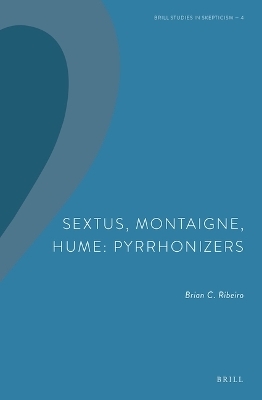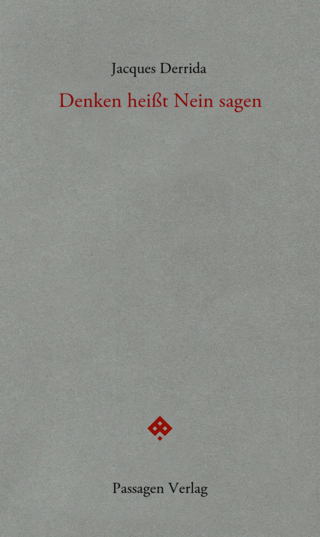
Sextus, Montaigne, Hume: Pyrrhonizers
Brill (Verlag)
978-90-04-46539-8 (ISBN)
This work invites us to view the Pyrrhonist tradition as involving all those who share a commitment to the activity of Pyrrhonizing and develops fresh, provocative readings of Sextus, Montaigne, and Hume as radical Pyrrhonizing skeptics: From the aspirationalism of Sextan Pyrrhonism, to Montaigne’s skeptical fideism and his unusual approach to the writing process, to the vexing interpretive issues surrounding Hume’s skepticism, each figure offers us new insights into what it can mean to Pyrrhonize.
Brian C. Ribeiro is U.C. Foundation & North Callahan Distinguished Professor of Philosophy at The University of Tennessee at Chattanooga, where he has taught since 2004. He specializes in the study of skepticism, ancient, early modern, and contemporary.
Acknowledgements
List of Abbreviations
Introduction
1 The Reality of Epistemic Akrasia
1 Epistemic Akrasia
2 What Would Epistemic Akrasia Involve?
3 Epistemic Akrasia Is Actual (and, Therefore, Possible)
4 Concluding Remarks (and Looking Forward)
2 Sextus, Montaigne, Hume: Exercises in Skeptical Cartography
1 Sextus Empiricus
2 Michel de Montaigne
3 David Hume
4 Concluding Remarks
3 Sextus Empiricus and Pyrrhonism as Aspirational
1 Is Pyrrhonism Psychologically Possible?
2 The Scope of Pyrrhonian Epochē
3 The Role of Pyrrhonian Epochē: Skepticism as a Eudaimonistic Ethic
4 Particularly Problematic Beliefs and Ataraxia
5 The Psychological Possibility of Pyrrhonism
6 Postscript
4 Montaigne’s Essays and/as Pyrrhonism
1 Approaching Montaigne’s Essays
2 The Presence of the Ancients in the Essays
3 Montaigne with Sextus and Cicero
4 Montaigne’s Skeptical Allegiance in the “Apology”
5 Is Montaigne Really a Pyrrhonist?
6 Montaigne’s Pyrrhonian Turn to Self-Examination
7 Montaigne’s Essays: Writing as Pyrrhonizing
5 Failing to be Responsive to Reasons: Unbudging Faith, Irresistible Beliefs
1 Hume on Montaigne’s (Doubt-Resistant) “Faith”
2 The Humean Maneuver
3 Rational Self-Control, Part 1
4 Rational Self-Control, Part 2
5 Concluding Remarks
6 Pyrrhonian Threads in the Great Humean Tapestry
1 Hume’s “Naturalism”?
2 So, Was Hume a Skeptic Then?
3 There Is No Satisfying Way to Interpret (All of) Hume
4 The Skeptical Threads of the Great Humean Tapestry
7 Hume on the “Durability” of Skepticism
1 A Treatise of Human Nature (1739/1740)
2 An Enquiry concerning Human Understanding (1748)
3 Dialogues concerning Natural Religion (1779)
4 Humility and Faith in Early Modern Philosophy
5 Concluding Remarks
8 The Fruits of Skepticism
1 Skepticism and Open-Minded Inquiry
2 Skepticism and Mental Tranquility
3 Skepticism and the Inward Turn
4 Skepticism and Intellectual Modesty
5 Parting Remarks
References
Index
| Erscheinungsdatum | 30.07.2021 |
|---|---|
| Reihe/Serie | Brill Studies in Skepticism ; 4 |
| Verlagsort | Leiden |
| Sprache | englisch |
| Maße | 155 x 235 mm |
| Gewicht | 422 g |
| Themenwelt | Geisteswissenschaften ► Philosophie ► Erkenntnistheorie / Wissenschaftstheorie |
| Geisteswissenschaften ► Philosophie ► Philosophie Altertum / Antike | |
| ISBN-10 | 90-04-46539-1 / 9004465391 |
| ISBN-13 | 978-90-04-46539-8 / 9789004465398 |
| Zustand | Neuware |
| Informationen gemäß Produktsicherheitsverordnung (GPSR) | |
| Haben Sie eine Frage zum Produkt? |
aus dem Bereich


